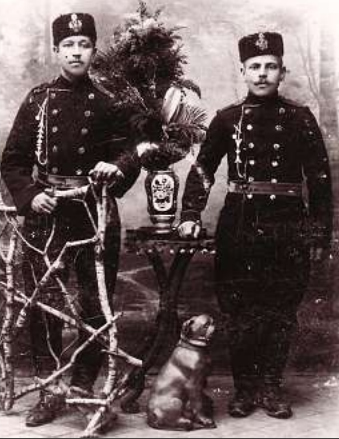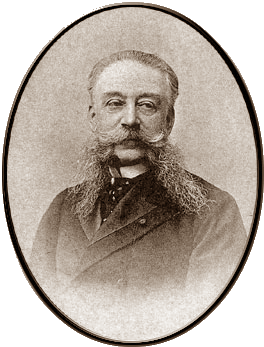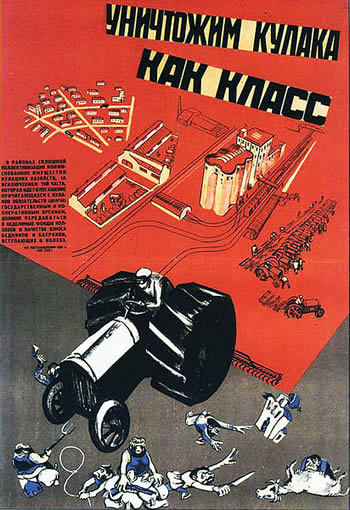![]()
![]()
The German settlements in the Black Sea Region1
(part 1 of 3)

Germans in the Imperial Army, about 1914
At the end of the 19th and the beginning of the 20th centuries, the settlers in the Black Sea region were under increasing pressure due to the lack of land for new colonies, the growing political pressures (the abolition of the privileges guaranteed in 1871, the introduction of con-scription2 in 1874 and Russification) as well as a growing hatred for the German colonists.
The peace after the Russo-Japanese War (1904-1905) lasted only nine years and the political tensions between the European governments increased rapidly in the course of approximately one decade. Germany, because of the deviation from Bismarck's foreign policy, had lost its military protection in the East. Some Russian magazines began to prepare the Russian people with anti-German articles in anticipation of coming events. The German language was no longer accepted and the German population was accused of opposing instruction in Russian. In school children were instructed to talk only in Russian, although it was not yet a law. Having a German name resulted in being denied promotions. Pan-Slavism forces3 attacked German property in Russia.
... ihre Vorfahren seien einst vom Reich finanziert worden, so dass sie den Russen die Adelsgüter vor der Nase weggekauft hätten und daher schuld an der Armut der ukrainischen Bevölkerung seien4.
Up to the First World War, the price of land available to the colonists had been raised 100 times. In addition to the 600,000 desiatine of land that had been awarded to them, the colonists had made at least ten times the original allotment of land arable.
More than 100.000 ethnic Germans served loyally in the tsarist army and with the outbreak of the First World War (August 1, 1914) a good part of the German intelligence were the best Russian patriots. However, the discrimination of the Germans, when compared to the other minorities and the ruler's people, resulted in an awareness in them that their Russian patriotism was misplaced and their allegiance turned the country of their ancestors. Their names told them that they were Germans and anyone who didn't want to admit this, was reminded of it by the Russians with the proverb: „So gut du den Wolf auch füttern magst, er wird immer nach dem Walde Ausschau halten"5.
Pastor Albert Kern of the Arzis Parish in Bessarabia recalled the situation in this way:
“....In August 1914 it felt like scales had fallen from our eyes! A war with Germany! We knew nothing more than to defend our ancestral homeland, even against our own flesh and blood. But we had the feeling that we were German, foreign 'invaders', a danger to the state..... Then came the Imperial ban, that all pigeons had to be slaughtered because they could be used in a pigeon espionage services. We boys had to carry out the death sentence ....... the old people were thinking."
Many colonists saw that no good come of all these decrees and migrated overseas to North and South America.
In the meantime, the German colonists, aside from some pastors, had virtually no contact with Germany. Only industrial goods were purchased from Germany. Kinship relations had been broken. Conversely, did the remaining relatives in Germany in the next generation knew hardly anything about their relatives who had emigrated to Russia or about the existence of German settlements in the Black Sea region. The German government showed little interest about the Germans living in Russia until 1914.
The German colonists in Russia were Russian citizens, and they had been regarded as loyal subjects and reliable, good taxpayers.

Ivan Logginovitch Goremykin
That would abruptly change on 1 August 1914 with the German declaration of war on the Russian Empire. Russian politicians and the Russian press began to openly preach hatred against everything German. They did not trust the German colonists who were declared "potential traitors" and the "enemy" and systematically attacked. Hatred and envy against the Germans blazed brighter as the news of the defeats at the front grew darker and more hopeless. Suspicions were raised that the Russian Germans were to blame. This sentiment was expressed explicitly in the words of Russian Prime Minister Goremykin:
"We are not only fighting against the German Empire, but against the Germans!”
Source: Velhagen & Klasings Monatshefte 30. Jahrgang 1915/1916, 1. Band, Berlin;
1 Thanks to S. Winkler for help with the English translation of this page
2 After the introduction of conscription on 1st January 1974, German colonists were required to register for military service. Depending on the branch of the military, service lasted from four to five years and in certain circumstances even longer. Klöstitz became the mustering site for the Bessarabian Germans. Mustering was held annually. The Russian government, however, did not require all conscripted recruits to serve. There were exemptions from military service, if the conscript was an only son, for sons whose fathers were old, sick or incapacitated, if they had brothers who had not reached the age of 18 years. All recruits who met these circumstances were allowed to return home, for the others the lottery began. Each recruit had to take a ‘lot’ out of a barrel. Then, those who received numbers from one in ascending order until the required number of recruits was reached became the group who had to serve. The others, who had drawn a higher lot number were released and did not have to serve.
3 Pan-Slavism appeared as a romantic nationalism at beginning of the 19th century. Its aim was the cultural, religious and political unity of all Slavonic people of Europe and, therefore, formed the ideological basis for the hostility towards the Russia Germans. The Russian Pan-Slavism had its origin in the religious community of the Orthodox Church.
First thoughts of a union of all Slavonic people under Russian leadership had already spread in the Russian Empire in the 17th century. Before the outbreak of the Russian Turkish war (1876/77) Pan-Slavism had become a certain ideology in Russia which was edged out after 1880 of the Panrussismus (Pan Russian ideology) which was the basis for Russification and policy of oppression. At first this policy was directed against the Polish people and the Jews, and then against non-orthodox Russians and non-Russian Orthodox people.
4 …once their ancestors had been financed by the Empire, in the way they would have bought the property of the Russian aristocracy from under the noses of the Russians and therefore, they are responsible for the poverty of the Ukrainian population. (Source: Leibbrandt Georg, Leibbrandt Hansgeorg: Hoffnungstal und seine Schwaben, Selbstverlag, Bonn, 1980;
5 "No matter how well you may feed the wolf, it will always keep a lookout to the forest" (Source: Albert Witt: Kurzgefaßte Chronik der Kolonie Alt-Arzis, Heimatmuseum der Deutschen aus Bessarabien, 1987, S. 126;)
6 Kulak = A disparaging term for medium and large Russian farmers. Kulak, which literally translated means "fist," refers to someone who holds his possessions 'firmly in his fists' and was used in the sense of "usurer" or "village capitalist".
After the October Revolution of 1917 and in the course of collectivization measures (1929/30) under Stalin, the term kulak became a profanity and extended to all rural "exploiters" who were to be liquidated as an enemy 'class'. At the highest point of collectivization (1932), it included minor agricultural property, such as a cow or the employment of day labourers or servants and it meant 'Kulakentum' (someone who belongs to the kulaks). It resulted in coercive measures: first, the requirement of higher deliveries, then expropriation and finally, deportation to deserted areas or banishment in the Gulag (the penal system of the Union of Soviet Socialist Republics consisting of a network of labor camps.) Often, the family members of the "Kulaks" and even alleged kulak mercenaries were also persecuted.
The Kulaks were divided into 3 categories:
- the farmers of the 1st category were considered "counter-revolutionary elements" who were shot immediately, or put in a labor camp of the GPU (State Political Directorate). Their property was confiscated and their relatives fell among the deported persons.
- The Kulaks of the 2nd category were considered less dangerous, but considered "terrible exploiters". They were expropriated, arrested and deported with their families to remote areas.
- The Kulaks of the 3rd category were considered to be "faithful to the State" and their property was expropriated and they were resettled to infertile and uncultivated zones of their districts.





